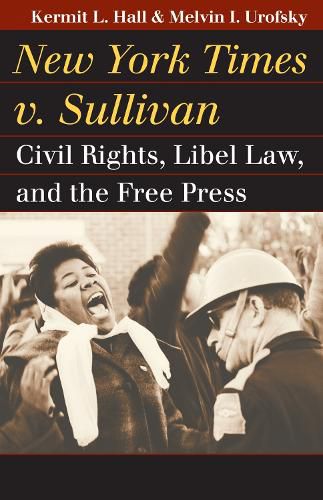Readings Newsletter
Become a Readings Member to make your shopping experience even easier.
Sign in or sign up for free!
You’re not far away from qualifying for FREE standard shipping within Australia
You’ve qualified for FREE standard shipping within Australia
The cart is loading…






Illuminating a classic case from the turbulent civil rights era of the 1960s, two of America’s foremost legal historians–Kermit Hall and Melvin Urofsky–provide a compact and highly readable updating of one of the most memorable decisions in the Supreme Court’s canon.
When the New York Timespublished an advertisement that accused Alabama officials of wilfully abusing civil rights activists, Montgomery police commissioner Lester Sullivan filed suit for defamation. Alabama courts, citing factual errors in the ad, ordered the Times to pay half a million dollars in damages. The Times appealed to the Supreme Court, which had previously deferred to the states on libel issues. The justices, recognising that Alabama’s application of libel law threatened both the nation’s free press and equal rights for African Americans, unanimously sided with the Times.
As memorably recounted twenty years ago in Anthony Lewis’s Make No Law, the 1964 decision profoundly altered defamation law, which the Court declared must not hinder debate on public issues even if it includes
vehement, caustic, and sometimes unpleasantly sharp attacks on government and public officials.
The decision also introduced a new First Amendment test: a public official cannot recover damages for libel unless he proves that the statement was made with the knowledge that it was false or with reckless disregard of whether it was false.
Hall and Urofsky, however, place a new emphasis on this iconic case. Whereas Lewis’s book championed freedom of the press, the authors here provide a stronger focus on civil rights and southern legal culture. They convey to readers the urgency of the civil rights movement and the vitriolic anger it inspired in the Deep South. Their insights place this landmark case within a new and enlightening frame.
$9.00 standard shipping within Australia
FREE standard shipping within Australia for orders over $100.00
Express & International shipping calculated at checkout
Illuminating a classic case from the turbulent civil rights era of the 1960s, two of America’s foremost legal historians–Kermit Hall and Melvin Urofsky–provide a compact and highly readable updating of one of the most memorable decisions in the Supreme Court’s canon.
When the New York Timespublished an advertisement that accused Alabama officials of wilfully abusing civil rights activists, Montgomery police commissioner Lester Sullivan filed suit for defamation. Alabama courts, citing factual errors in the ad, ordered the Times to pay half a million dollars in damages. The Times appealed to the Supreme Court, which had previously deferred to the states on libel issues. The justices, recognising that Alabama’s application of libel law threatened both the nation’s free press and equal rights for African Americans, unanimously sided with the Times.
As memorably recounted twenty years ago in Anthony Lewis’s Make No Law, the 1964 decision profoundly altered defamation law, which the Court declared must not hinder debate on public issues even if it includes
vehement, caustic, and sometimes unpleasantly sharp attacks on government and public officials.
The decision also introduced a new First Amendment test: a public official cannot recover damages for libel unless he proves that the statement was made with the knowledge that it was false or with reckless disregard of whether it was false.
Hall and Urofsky, however, place a new emphasis on this iconic case. Whereas Lewis’s book championed freedom of the press, the authors here provide a stronger focus on civil rights and southern legal culture. They convey to readers the urgency of the civil rights movement and the vitriolic anger it inspired in the Deep South. Their insights place this landmark case within a new and enlightening frame.